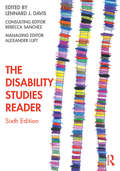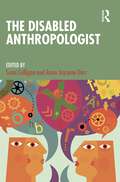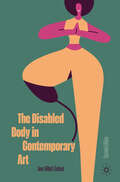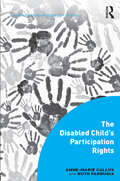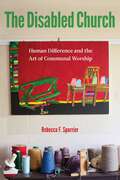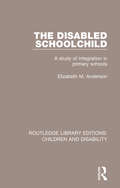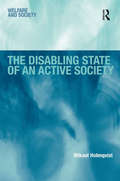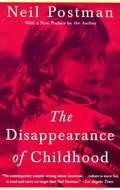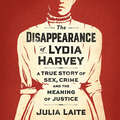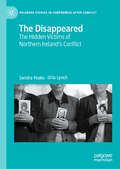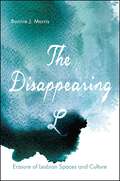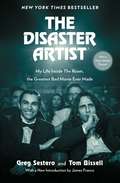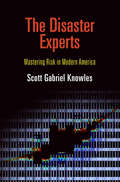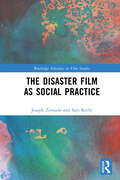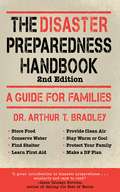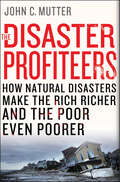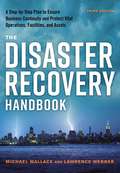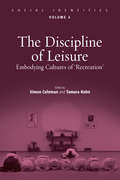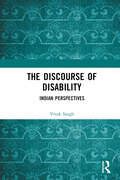- Table View
- List View
The Disability Studies Reader
by Lennard J. DavisDisability studies has gone from being a relatively unknown field to one of increasing importance in the social sciences. The sixth edition of The Disability Studies Reader brings in new topics, scholars, writers, artists, and essays to address links between ableism and imperialism; disability bioethics; and the relationship between disability agency, social policy, and decarceration. There are as many meanings and experiences of disability as there are disabled people, and this diversity ensures that the work of the field will continue to evolve. Fully revised and brought up to date, this volume addresses a wider range of geographical and cultural contexts, and many pay specific attention to the intersections between disability and race, gender, and sexuality. The growing interest and activism around the issue of neuroatypicality is also reflected in a new section on neurodivergence. The Disability Studies Reader remains an excellent touchstone for students in disability studies courses across the disciplines, including the social sciences, English literature, and psychology.
The Disability Studies Reader
by Lennard J. DavisThe fifth edition of The Disability Studies Reader addresses the post-identity theoretical landscape by emphasizing questions of interdependency and independence, the human-animal relationship, and issues around the construction or materiality of gender, the body, and sexuality. Selections explore the underlying biases of medical and scientific experiments and explode the binary of the sound and the diseased mind. The collection addresses physical disabilities, but as always investigates issues around pain, mental disability, and invisible disabilities as well. Featuring a new generation of scholars who are dealing with the most current issues, the fifth edition continues the Reader’s tradition of remaining timely, urgent, and critical.
The Disability Studies Reader, 4th Edition
by Lennard J. DavisThe Fourth Edition of the Disability Studies Reader breaks new ground by emphasizing the global, transgender, homonational, and posthuman conceptions of disability. Including physical disabilities, but exploring issues around pain, mental disability, and invisible disabilities, this edition explores more varieties of bodily and mental experience. New histories of the legal, social, and cultural give a broader picture of disability than ever before. Now available for the first time in eBook format 978-0-203-07788-7.
The Disabled Anthropologist
by Sumi Colligan Anna Jaysane-DarrThis book brings much needed attention to disabled anthropologists, making clear that “disabled” and “anthropologist” belong together. The disabled anthropologists who contribute to this volume and on which these chapters focus have refused erasure from a profession that would ignore their critiques and creativity. Applying autoethnographic, photographic, and poetic venues, the contributors assess the drawbacks of their anthropology training programs, the limitations of accessibility practices in the academy, and how their own embodiments and the contingencies of their research and research settings have facilitated the discovery of novel methodologies and insights. Collectively this volume’s contributors demonstrate a shared concern for the wellbeing of disabled ethnographers and interlocutors, whether working with Colombian refugees in Ecuador or those living with chronic pain in Michigan.The Disabled Anthropologist is essential reading for students and scholars working in cultural and medical anthropology.
The Disabled Body in Contemporary Art
by Ann Millett-GallantThe second edition offers an essential update to the foundational first edition, The Disabled Body in Contemporary Art. Featuring updated chapters and case studies, this second edition will not only expand on the first edition but will bring a new focus to contemporary disabled artists and their embodied, multimedia work.
The Disabled Child's Participation Rights (Interdisciplinary Disability Studies)
by Anne-Marie Callus Ruth FarrugiaThe United Nations Convention on the Rights of Persons with Disabilities is the only UN treaty to date in which the people who are its target, that is disabled people, were actively involved in its drafting and the only one which requires the active participation of disabled people in its implementation. This does not, of course, automatically guarantee the direct participation of all disabled people. This is especially so for children with disabilities, whose status as legal minors may inhibit them from participating in decisions affecting their lives. This book focuses on the participation rights of the disabled child with regard to health, education, homelife and relationships, highlighting ways in which these rights are safeguarded and promoted throughout the EU, as well as exploring the factors that put these rights at risk. Finally, this groundbreaking text analyses whether disabled children’s needs for assistance in order to realise their participation rights results in fewer opportunities to participate or in an increase in support in order for them to be able to do so.
The Disabled Church: Human Difference and the Art of Communal Worship
by Rebecca F. SpurrierHow do communities consent to difference? How do they recognize and create the space and time necessary for the differences and disabilities of those who constitute them? Christian congregations often make assumptions about the shared abilities, practices, and experiences that are necessary for communal worship. The author of this provocative new book takes a hard look at these assumptions through a detailed ethnographic study of an unusual religious community where more than half the congregants live with diagnoses of mental illness, many coming to the church from personal care homes or independent living facilities. Here, people’s participation in worship disrupts and extends the formal orders of worship. Whenever one worships God at Sacred Family Church, there is someone who is doing it differently.Here, the author argues, the central elements and the participation in the symbols of Christian worship raise questions rather than supply clear markers of unity, prompting the question, What do you need in order to have a church that assumes difference at its heart?Based on three years of ethnographic research, The Disabled Church describes how the Sacred Family community, comprising people with very different mental abilities, backgrounds, and resources, sustains and embodies a common religious identity. It explores how an ethic of difference is both helped and hindered by a church’s embodied theology. Paying careful attention to how these congregants improvise forms of access to a common liturgy, this book offers a groundbreaking theology of worship that engages both the fragility and beauty revealed by difference within the church. As liturgy requires consent to difference rather than coercion, an aesthetic approach to differences within Christian liturgy provides a frame for congregations and Christian liturgists to pay attention to the differences and disabilities of worshippers. This book creates a distinctive conversation between critical disability studies, liturgical aesthetics, and ethnographic theology, offering an original perspective on the relationship between beauty and disability within Christian communities. Here is a transformational theological aesthetics of Christian liturgy that prioritizes human difference and argues for the importance of the Disabled Church.
The Disabled Schoolchild: A Study of Integration in Primary Schools (Routledge Library Editions: Children and Disability #2)
by Anderson Elizabeth M.First published in 1973, this book considers the differences between mainstream schools and special educational needs schools, for children with learning disabilities. It contains a wealth of research data, case history material and reference to existing literature, designed to answer many questions which parents, heads, and schoolteachers have asked. Questions considered include whether children with disabilities do as well in ordinary schools as children without, whether they are as happy and well adjusted, and how they fit into the social structure of the class. The book also looks at whether much teasing occurs and how practical difficulties can be overcome.
The Disabling State of an Active Society (Welfare and Society)
by Mikael HolmqvistAcross the traditional welfare states of Europe, Australia, New Zealand and Canada there has been increasing emphasis on 'activation' by the unemployed as a tool for fighting unemployment. The core idea of activation programmes is the integration and empowerment of jobseekers through active work-related measures rather than passive income support. However, the empirical evidence of the efficacy of activation programmes is far from conclusive and there have been no systematic studies of the effects of activation programmes on the lives of the unemployed people who come into contact with them. This book is based on a detailed ethnographic study of the highly praised Swedish rehabilitation organization Samhall. The result is a key volume for those working and studying within welfare, poverty, disability and special needs.
The Disappearance of Childhood
by Neil PostmanThe author of Technopoly, suggests that childhood is a relatively recent invention, which came into being as the new medium of print imposed divisions between children and adults. But now these divisions are eroding under the barrage of television, which turns the adult secrets of sex and violence into popular entertainment and pitches both news and advertising at the intellectual level of ten-year-olds.
The Disappearance of Hong Kong in Comics, Advertising and Graphic Design (East Asian Popular Culture)
by Wendy Siuyi WongThis book examines Hong Kong’s struggle against the disappearance of its unique identity under the historical challenges of colonialism, in addition to the more recent reimposition of Chinese authoritarian government control, as reflected in three under-researched forms of visual media: comics, advertising and graphic design. Each section of the book focuses on one of these three forms, and each chapter focuses on one stage of Hong Kong’s changing cultural identity. The articulative position of this book is on studies of visual cultural history and media communication. Its case studies will broaden readers’ own cultural knowledge for a more international understanding. The Disappearance of Hong Kong in Comics, Advertising and Graphic Design advances the development of its three key subjects in terms of identity, communication and cultural politics, aiming to reach a wide range of multidisciplinary readers.
The Disappearance of Lydia Harvey: A true story of sex, crime and the meaning of justice
by Julia LaiteWINNER OF THE CWA ALCS GOLD DAGGER FOR NON-FICTION 1910, Wellington, New Zealand. Lydia Harvey is sixteen, working long hours for low pay, when a glamorous couple invite her to Buenos Aires. She accepts - and disappears. 1910, London, England. Amid a global panic about sex trafficking, detectives are tracking a ring of international criminals when they find a young woman on the streets of Soho who might be the key to cracking the whole case. As more people are drawn into Lydia's life and the trial at the Old Bailey, the world is being reshaped into a new, global era. Choices are being made - about who gets to cross borders, whose stories matter and what justice looks like - that will shape the next century. In this immersive account, historian Julia Laite traces Lydia Harvey through the fragments she left behind to build an extraordinary story of aspiration, exploitation and survival - and one woman trying to build a life among the forces of history.
The Disappeared: The Hidden Victims of Northern Ireland's Conflict (Palgrave Studies in Compromise after Conflict)
by Orla Lynch Sandra PeakeThis short book focuses on the Disappearances that occurred during the Troubles in Northern Ireland. Using in-depth interviews with thirteen families of those individuals who were abducted, murdered and secretly buried from the 1970's onwards, this book examines the experience of the families and communities left behind. Through an exploration of the historic and cultural origins of the contemporary IRA and how they came to be in the position of power within Catholic/Nationalist communities during the troubles, the context to the disappearances are presented. This book reviews the journey undertaken by the families, from the initial disappearance of their loved one and the suffocating silence that followed, through their coming together as a self-help group. It follows their lobbying on a national and international basis leading to the return of the bodies of some of their loved ones and the solidarity which leads them to fight on as a group to recover the bodies that remain missing. It also examines the involvement of the British and Irish and American governments in the set up of the International Commission for the Location of Victim's Remains and tells the story of the Clinton's personal involvement in supporting the families in their ongoing quest for recovery. It is written accessibly for researchers and practitioners.
The Disappearing L: Erasure of Lesbian Spaces and Culture (SUNY series in Queer Politics and Cultures)
by Bonnie J. MorrisA 2018 Over the Rainbow Selection presented by the Gay, Lesbian, Bisexual, and Transgendered Round Table (GLBTRT) of the American Library AssociationLGBT Americans now enjoy the right to marry—but what will we remember about the vibrant cultural spaces that lesbian activists created in the 1970s, 80s, and 90s? Most are vanishing from the calendar—and from recent memory. The Disappearing L explores the rise and fall of the hugely popular women-only concerts, festivals, bookstores, and support spaces built by and for lesbians in the era of woman-identified activism. Through the stories unfolding in these chapters, anyone unfamiliar with the Michigan festival, Olivia Records, or the women's bookstores once dotting the urban landscape will gain a better understanding of the era in which artists and activists first dared to celebrate lesbian lives. This book offers the backstory to the culture we are losing to mainstreaming and assimilation. Through interviews with older activists, it also responds to recent attacks on lesbian feminists who are being made to feel that they've hit their cultural expiration date.
The Disappearing Mestizo: Configuring Difference in the Colonial New Kingdom of Granada
by Joanne RappaportMuch of the scholarship on difference in colonial Spanish America has been based on the "racial" categorizations of indigeneity, Africanness, and the eighteenth-century Mexican castas system. Adopting an alternative approach to the question of difference, Joanne Rappaport examines what it meant to be mestizo (of mixed parentage) in the early colonial era. She draws on lively vignettes culled from the sixteenth- and seventeenth-century archives of the New Kingdom of Granada (modern-day Colombia) to show that individuals classified as "mixed" were not members of coherent sociological groups. Rather, they slipped in and out of the mestizo category. Sometimes they were identified as mestizos, sometimes as Indians or Spaniards. In other instances, they identified themselves by attributes such as their status, the language that they spoke, or the place where they lived. The Disappearing Mestizo suggests that processes of identification in early colonial Spanish America were fluid and rooted in an epistemology entirely distinct from modern racial discourses.
The Disarticulate: Language, Disability, and the Narratives of Modernity (Cultural Front)
by James BergerLanguage is integral to oursocial being. But what is the status of those who stand outside of language?The mentally disabled, “wild” children, people with autism and otherneurological disorders, as well as animals, infants, angels, and artificialintelligences, have all engaged with language from a position at its borders.In the intricate verbal constructions of modern literature, the‘disarticulate’—those at the edges of language—have, paradoxically, playedessential, defining roles. Drawing on the disarticulate figures inmodern fictional works such as Billy Budd, The Sound and the Fury,Nightwood, White Noise, and The Echo Maker, among others,James Berger shows in this intellectually bracing study how these charactersmark sites at which aesthetic, philosophical, ethical, political, medical, andscientific discourses converge. It is also the place of the greatest ethicaltension, as society confronts the needs and desires of “the least of itsbrothers.” Berger argues that the disarticulate is that which is unaccountablein the discourses of modernity and thus stands as an alternative to theprevailing social order. Using literary history and theory, as well asdisability and trauma theory, he examines how these disarticulate figuresreveal modernity’s anxieties in terms of how it constructs its others.
The Disaster Artist
by Tom Bissell Greg SesteroFrom the actor who lived through it all and an award-winning narrative nonfiction writer: the inspiring and laugh-out-loud funny story of a mysteriously wealthy social misfit who got past every road block in the Hollywood system to achieve success on his own terms--the making of The Room, "the Citizen Kane of bad movies" (Entertainment Weekly).In 2003, an independent film called The Room--written, produced, directed, and starring a very rich social misfit of indeterminate age and origin named Tommy Wiseau--made its disastrous debut in Los Angeles. Described by one reviewer as "like getting stabbed in the head," the $6 million film earned a grand total of $1,800 at the box office and closed after two weeks. Now in its tenth anniversary year, The Room is an international phenomenon to rival The Rocky Horror Picture Show. Thousands of fans wait in line for hours to attend screenings complete with costumes, audience rituals, merchandising, and thousands of plastic spoons. Readers need not have seen The Room to appreciate its costar Greg Sestero's account of how Tommy Wiseau defied every law of artistry, business, and interpersonal relationships to achieve the dream only he could love. While it does unravel mysteries for fans--who on earth is "Steven," and what's with that hospital on Guerrero Street?--The Disaster Artist is more than just a hilarious story about cinematic hubris. It is ultimately a surprisingly inspiring tour de force that reads like a page-turning novel, an open-hearted portrait of an enigmatic man who will capture your heart.
The Disaster Experts
by Scott Gabriel KnowlesIn the wake of 9/11 and Hurricane Katrina, many are asking what, if anything, can be done to prevent large-scale disasters. How is it that we know more about the hazards of modern American life than ever before, yet the nation faces ever-increasing losses from such events? History shows that disasters are not simply random acts. Where is the logic in creating an elaborate set of fire codes for buildings, and then allowing structures like the Twin Towers--tall, impressive, and risky--to go up as design experiments? Why prepare for terrorist attacks above all else when floods, fires, and earthquakes pose far more consistent threats to American life and prosperity?The Disaster Experts takes on these questions, offering historical context for understanding who the experts are that influence these decisions, how they became powerful, and why they are only slightly closer today than a decade ago to protecting the public from disasters. Tracing the intertwined development of disaster expertise, public policy, and urbanization over the past century, historian Scott Gabriel Knowles tells the fascinating story of how this diverse collection of professionals--insurance inspectors, engineers, scientists, journalists, public officials, civil defense planners, and emergency managers--emerged as the authorities on risk and disaster and, in the process, shaped modern America.
The Disaster Film as Social Practice (Routledge Advances in Film Studies)
by Joseph Zornado Sara ReillySurveying disaster films from a Lacanian psychoanalytic perspective, this book explores the disaster film genre from its initial appearance in 1933 (The Grapes of Wrath, 1933) to its present-day form (Don’t Look Up!, 2021), laying bare the ideological unconscious at work within the genre.The Disaster Film as Social Practice examines environmental science, history, film and literature in its interdisciplinary analysis of the disaster film genre. It explores the interplay, and the dichotomy, of “restorative” and “reflective” disaster narratives. An analysis of cinema's role in symbolizing and managing collective anxiety around disaster and death narratives examines how disaster films, through their narrative structures and symbolic elements, contribute to the public's understanding and emotional processing of real-world threats, and how cinematic narratives shape and are shaped by public and private ideological discourses, reflecting deeper psychological and environmental truths. Finally, the book offers an overview of how the transformation of the disaster film genre over time tells a history through imagining the worst. Providing a nuanced understanding of the disaster film genre and its significance in contemporary culture and thought, this book will be of interest to scholars and students of film studies, cultural studies, media studies, and environmental studies.
The Disaster Preparedness Handbook: A Guide for Families
by Arthur T. BradleyNinety-nine percent of the time, the world spins like a top, the skies are clear, and your refrigerator is full of good food. But the world is a volatile place—storms rage, fires burn, and diseases spread. No one is ever completely safe. Humans live as part of a very complex ecosystem that is unpredictable and merciless. Could you protect your family in the case of an emergency—domestic or global?The Disaster Preparedness Handbook will help you to establish a practical disaster plan for your entire family (covering all fourteen basic human needs) in case the unpredictable happens. Additional information is also presented for those with special needs, including the elderly and disabled, children, pregnant women, and even pets. Well-researched by an army veteran and current NASA engineer, this is the essential guide every family should have, study, and keep handy, in case the unthinkable should occur.
The Disaster Profiteers: How Natural Disasters Make the Rich Richer and the Poor Even Poorer
by John C. MutterNatural disasters don't matter for the reasons we think they do. They generally don't kill a huge number of people. Most years more people kill themselves than are killed by Nature's tantrums. And using standard measures like Gross Domestic Product (GDP) it is difficult to show that disasters significantly interrupt the economy.It's what happens after the disasters that really matters-when the media has lost interest and the last volunteer has handed out a final blanket, and people are left to repair their lives. What happens is a stark expression of how unjustly unequal our world has become. The elite make out well-whether they belong to an open market capitalist democracy or a closed authoritarian socialist state. In Myanmar-a country ruled by a xenophobic military junta-the generals and their cronies declared areas where rice farms were destroyed by Cyclone Nargis as blighted and simply took the land. In New Orleans the city was re-shaped and gentrified post Katrina, making it almost impossible for many of its poorest, mostly black citizens to return.In The Disaster Profiteers, John Mutter argues that when no one is looking, disasters become a means by which the elite prosper at the expense of the poor. As the specter of increasingly frequent and destructive natural disasters looms in our future, this book will ignite an essential conversation about what we can do now to create a safer, more just world for us all.
The Disaster Recovery Handbook: A Step-by-Step Plan to Ensure Business Continuity and Protect Vital Operations, Facilities, and Assets
by Michael Wallace Lawrence WebberThe twenty-first century is an unpredictable place. While you cannot predict or prevent disasters, you can prepare for them with effort and planning.A quick survey of the headlines for any given day in the twenty-first century will highlight global market-affecting disasters such as superstorms, data breaches, pandemics, system failures, and strikes.With the detailed guidance found in the thoroughly updated version of this handbook, your company&’s survival and the speedy resumption of business is all but assured.In The Disaster Recovery Handbook, you will learn how to proactively:Assess riskCreate and document recovery proceduresAssemble a disaster teamTest and debug thoroughlySafeguard vital records, and more!With The Disaster Recovery Handbook by your side--including the third edition&’s updates of emerging risks, developments in IT networking, and information security--you can learn how to avoid a great deal of potential trouble for your organization.When unavoidable, unpredictable disasters occur, you will know that you have planned for every contingency and have ensured that your company is responsible, ready, and resilient.
The Discipline Of Leisure: Embodying Cultures of 'Recreation' (Social Identities #4)
by Simon Coleman Tamara KohnThe burgeoning social scientific study of tourism has emphasized the effects of the post-industrial economy on travel and place. However, this volume takes some of these issues into a different area of leisure: the spare-time carved out by people as part of their everyday lives - time that is much more intimately juxtaposed with the pressures and influences of work life, and which often involves specific bodily practices associated with hobbies and sports. An important focus of the book is the body as a site of identity formation, experience, and disciplined recreation of the self. Contributors examine the ways rituals, sports, and forms of bodily transformation mediate between contemporary ideologies of freedom, choice and self-control.
The Discourse of Disability: Indian Perspectives
by Vivek SinghThis book explores the concept of disability through a social, political, cultural, religious, and economics lens. It challenges the categorization of ‘physically-disabled’ produced by way of legal, medical, political, cultural, and literary narratives that comprise an exclusionary discourse.The volume discusses themes like disability and identity politics; disability and the western epistemology; disability in India; disability and the Indian English fiction and Hindi cinema to question the embodied hegemony of ‘norms’ and their effects in the construction and history of societies. It analyses select literary and cinematic texts like Trying to Grow, Fireproof, and Animal’s People; and movies, Black and Lafangey Parindey to critically examine the representation of disabled people as freak, monstrous and animal. The book also makes policy recommendations for inclusive education and work norms for disabled people.This book will be beneficial for scholars and researchers of disability studies, cultural studies, film studies, and English literature.
The Discourse of Exile in Early Modern English Literature
by J. Seth LeeThis volume examines the literary works of English exiles seeking to navigate what Edward Said calls "the perilous territory of not-belonging." The study opens by asking, "How did exile impact the way an early modern writer defined and constructed their personal and national identity?" In seeking an answer, the project traces the development of the "mind of exile," a textual phenomenon that manifests as an exiled figure whose departure and return restructures a stable, traditional center of socio-political power; a narrative where a character, an author, a reader, or some combination of the three experiences a type of cognitive displacement resulting in an epiphany that helps define a sense of self or national identity; and narratives that write and rewrite historical narratives to reimagine boundaries of national identity either towards or away from exiled groups or individuals. The study includes case studies from a variety of authors and groups – Geoffrey Chaucer, Edmund Spenser, the Wycliffites, the Marian Exiles, and their Elizabethan Catholic counterparts – to provide a clearer understanding of exile as an important part of the development of a modern English national identity. Reading exilic texts through this lens offers a fresh approach to early modern narratives of marginalization while examining and clarifying the importance of the individual experience of exile filtered through literary consciousness.
